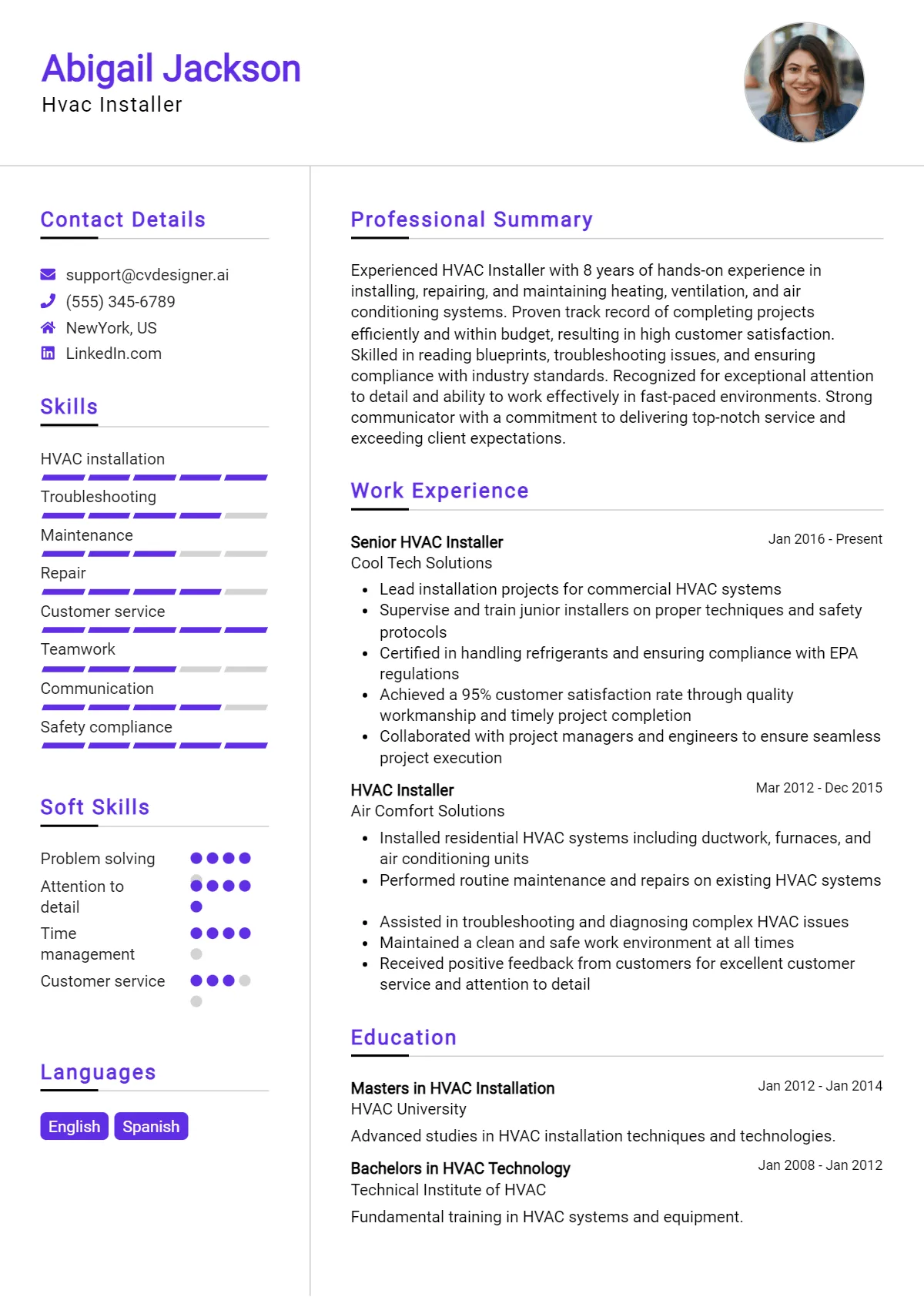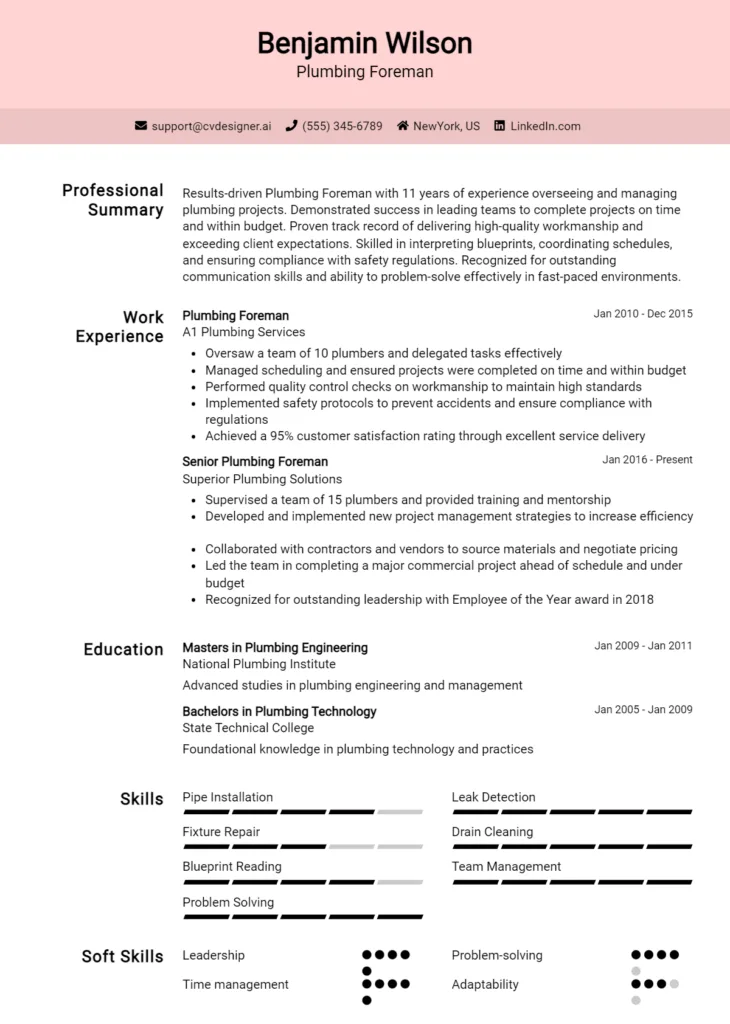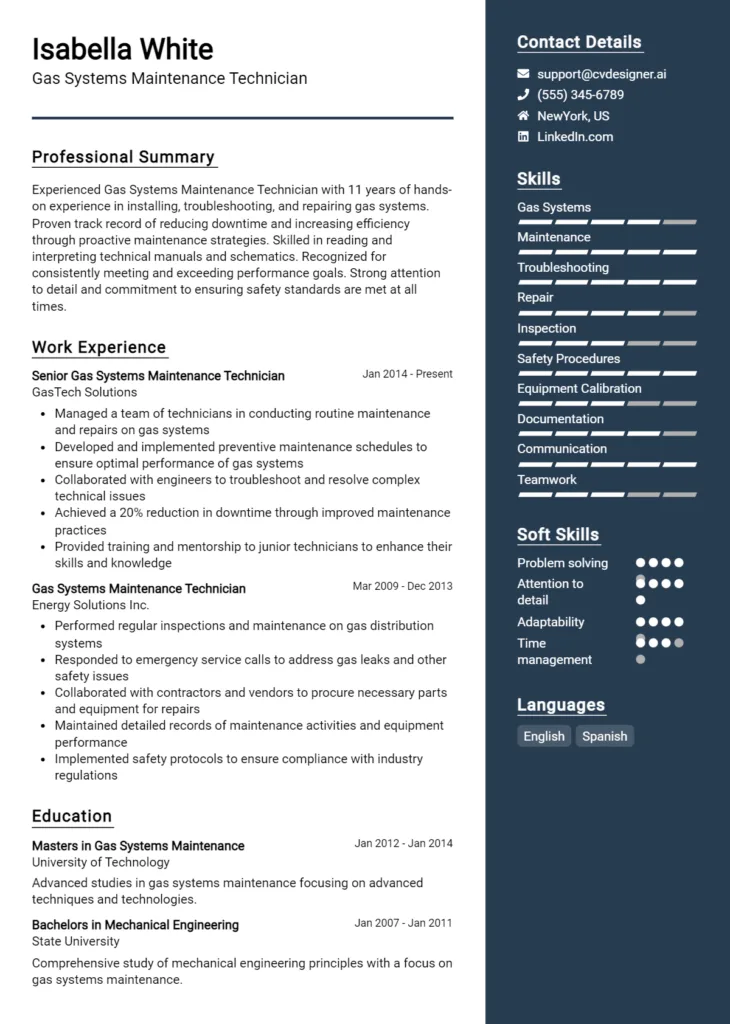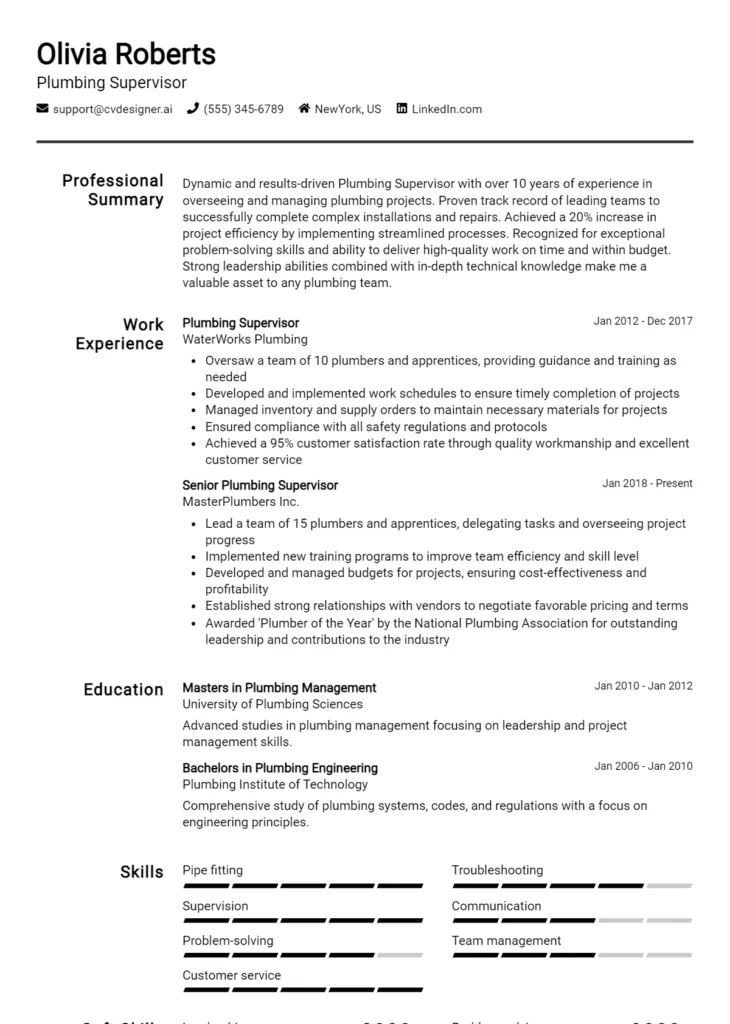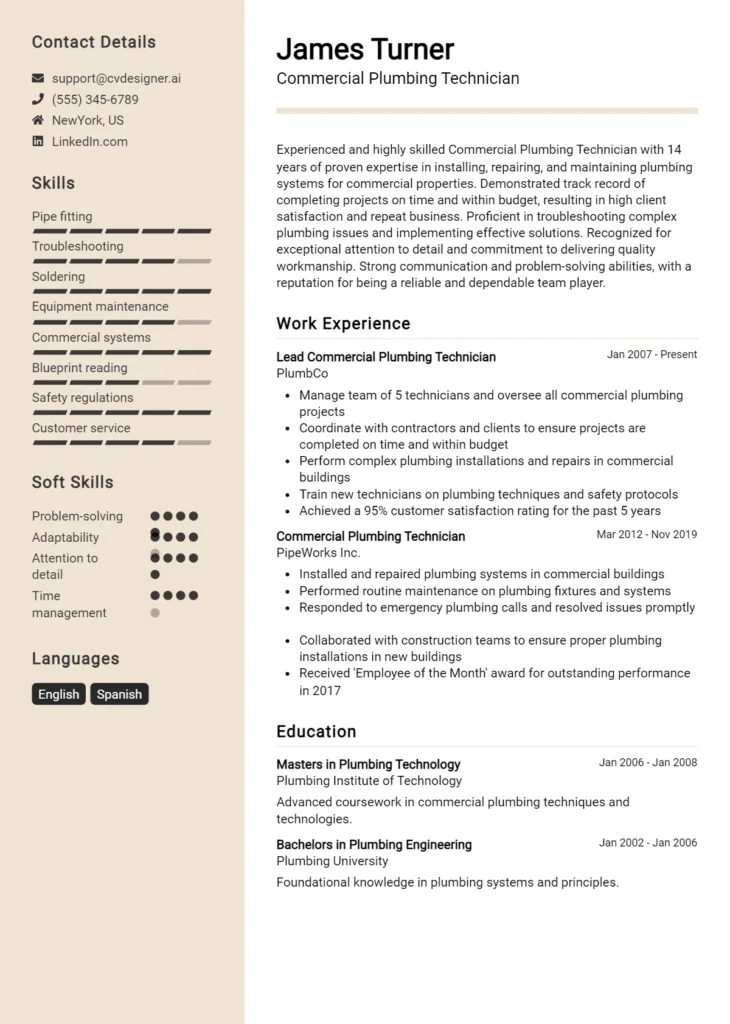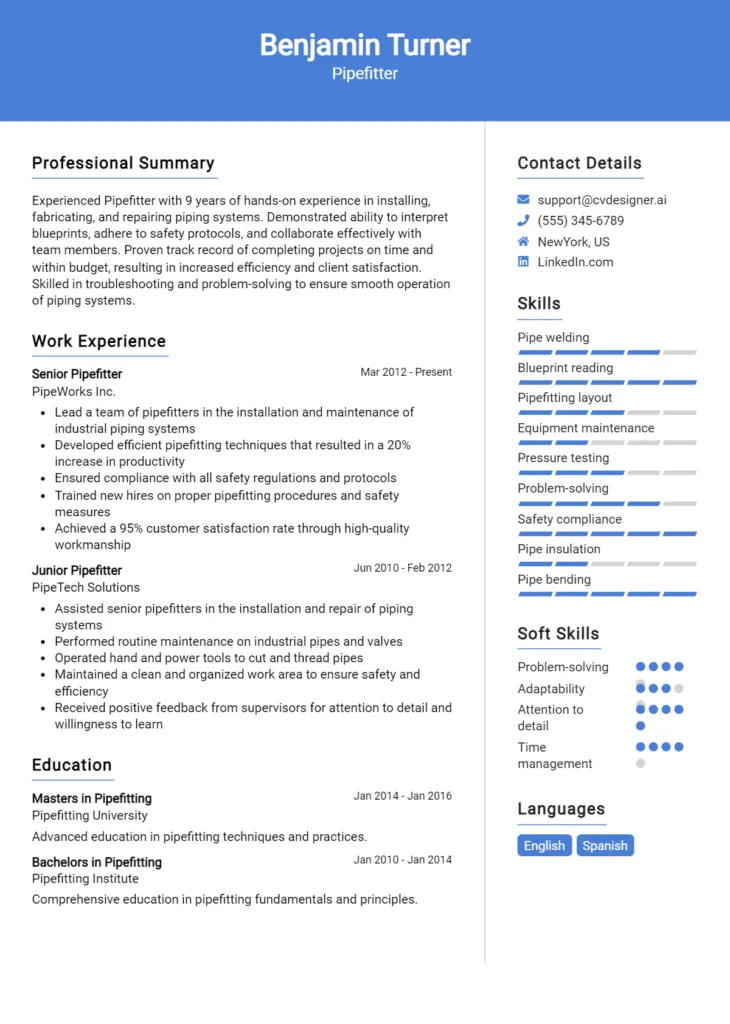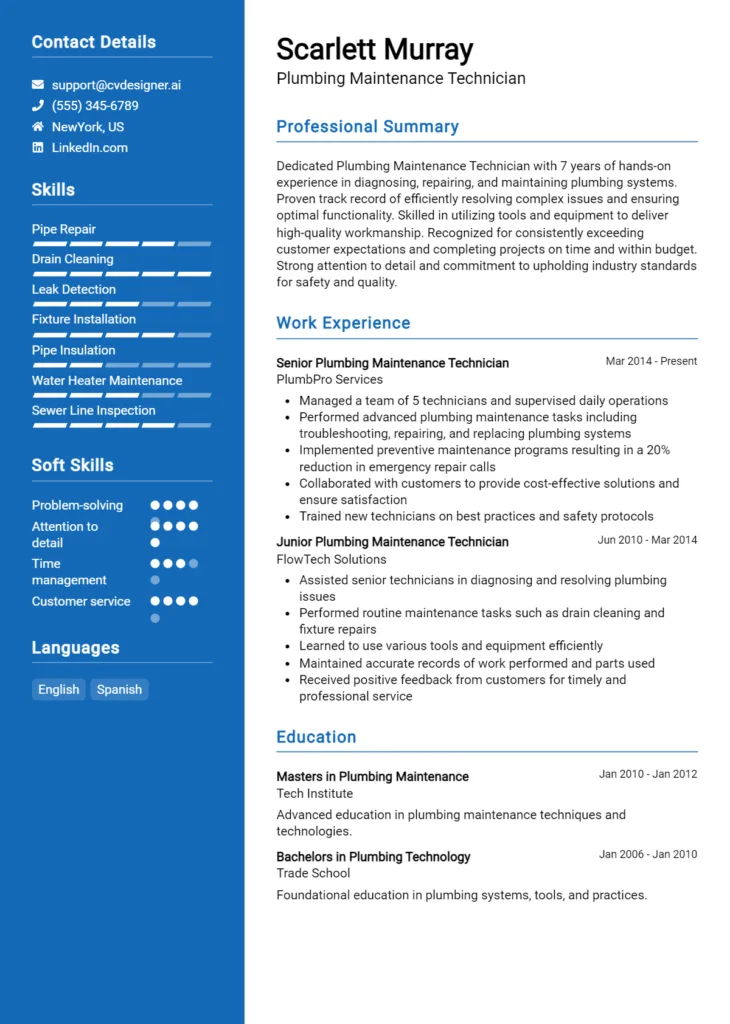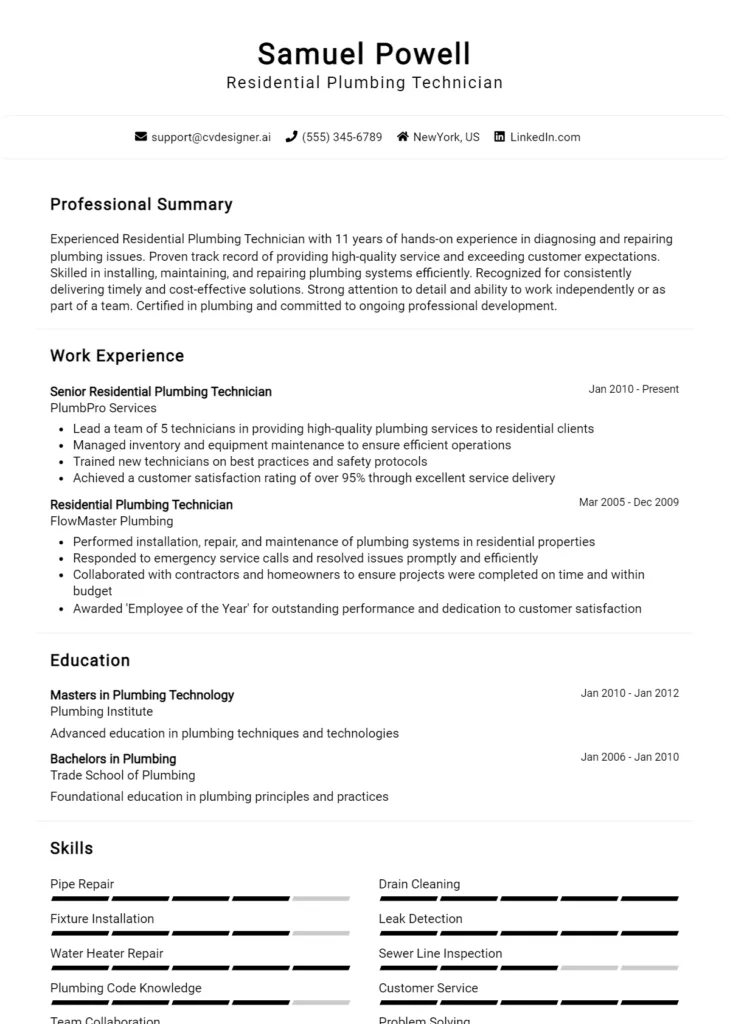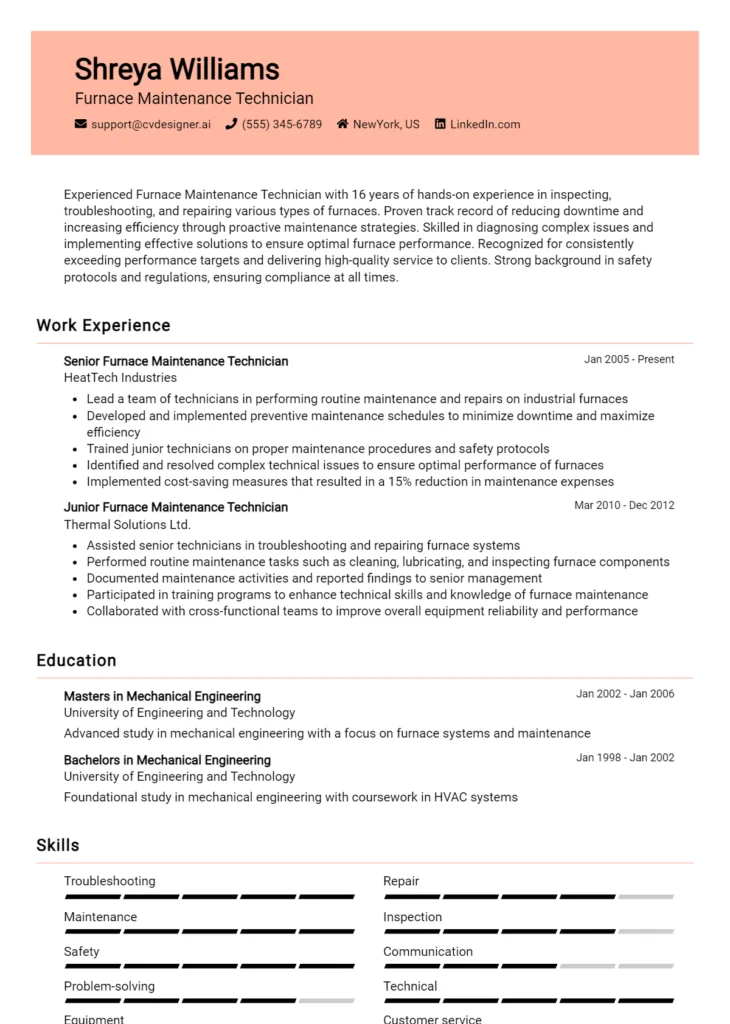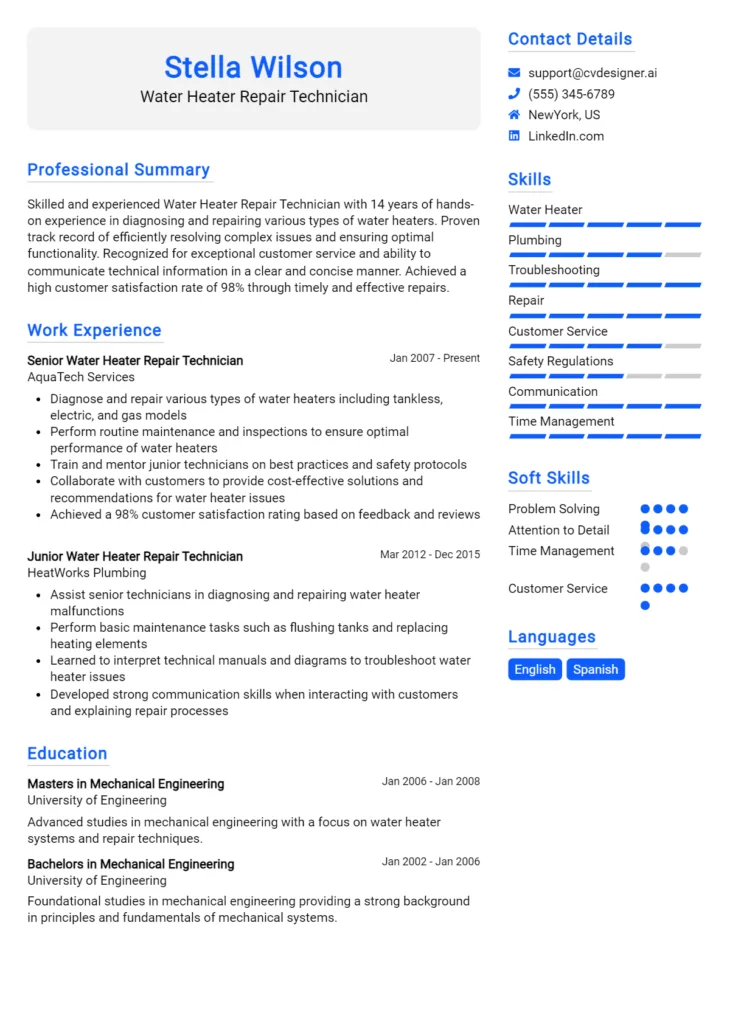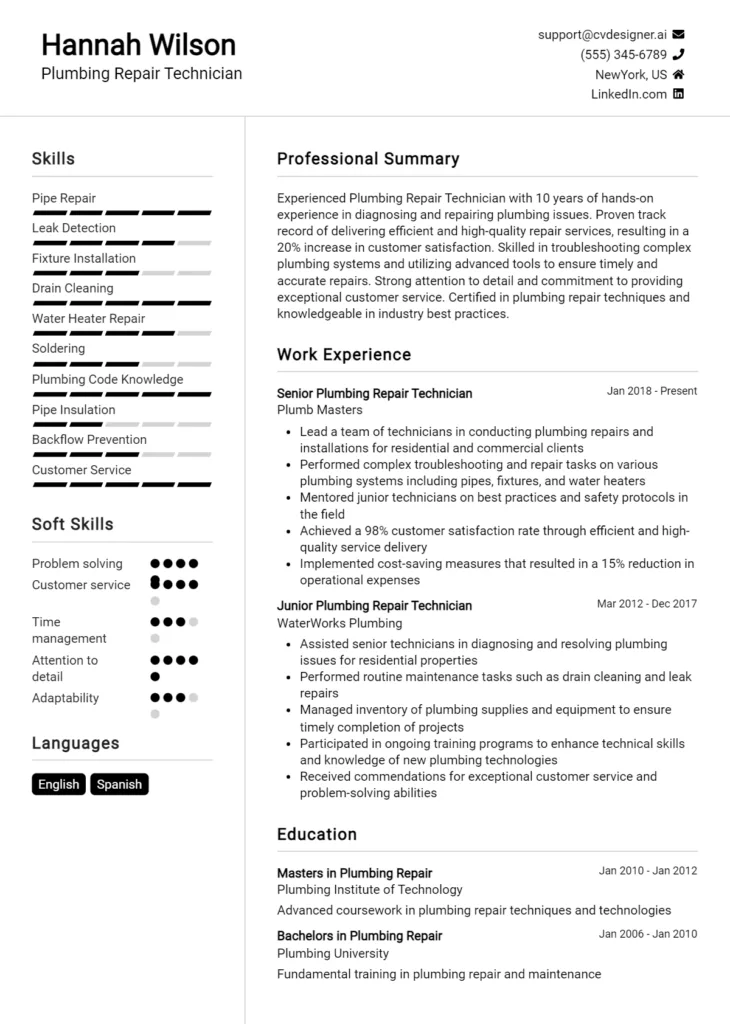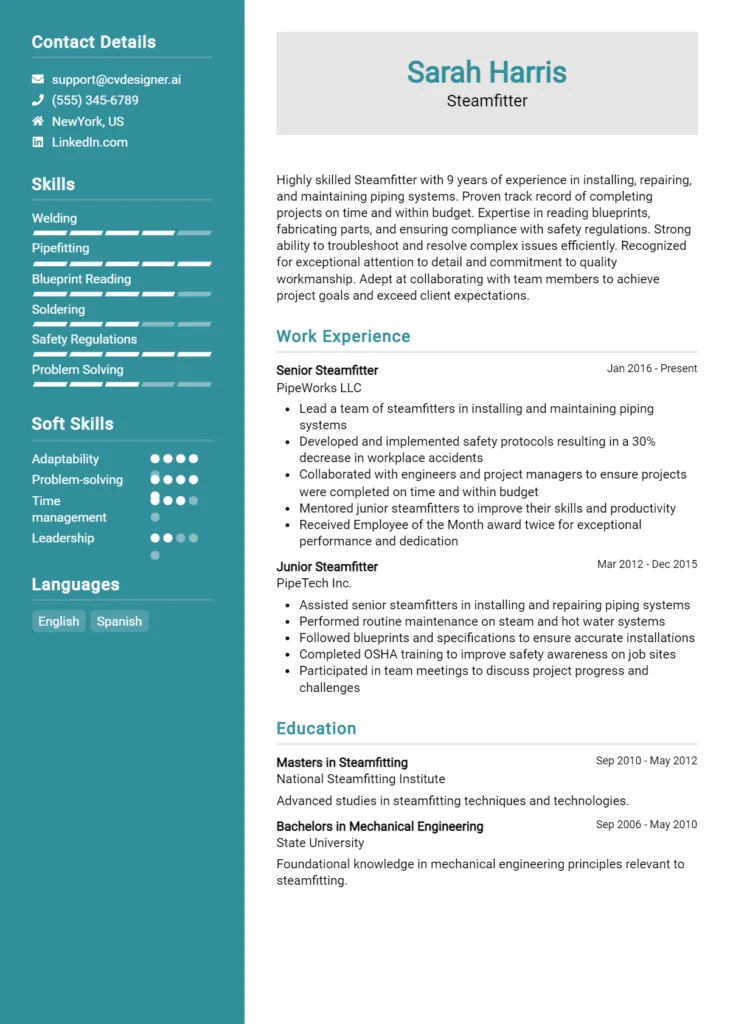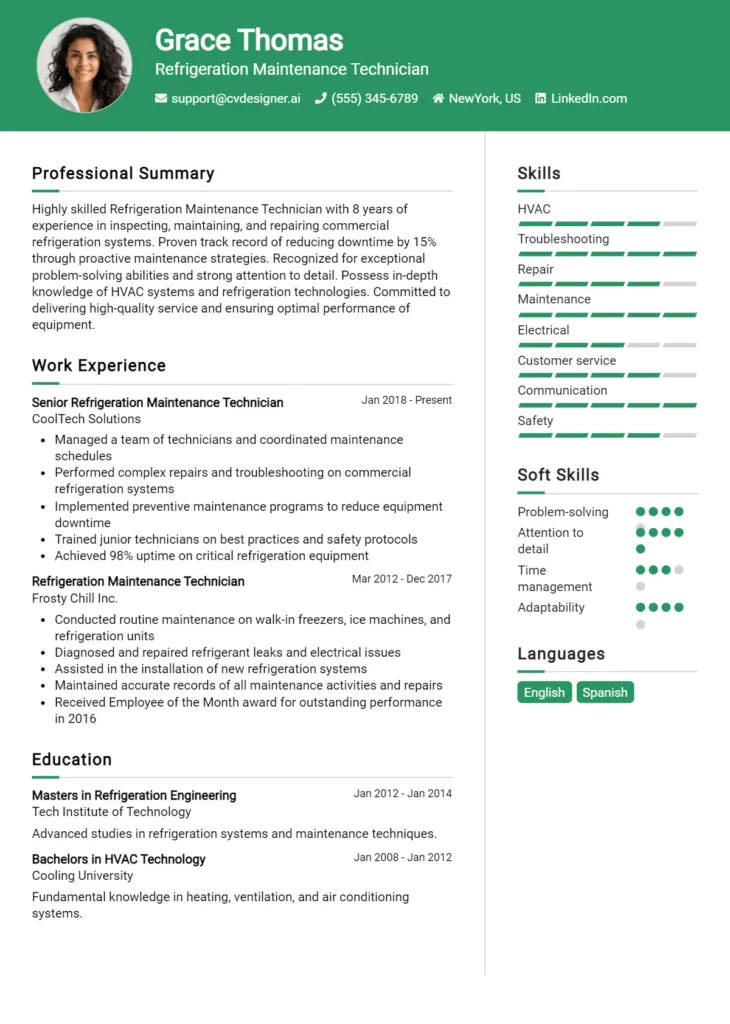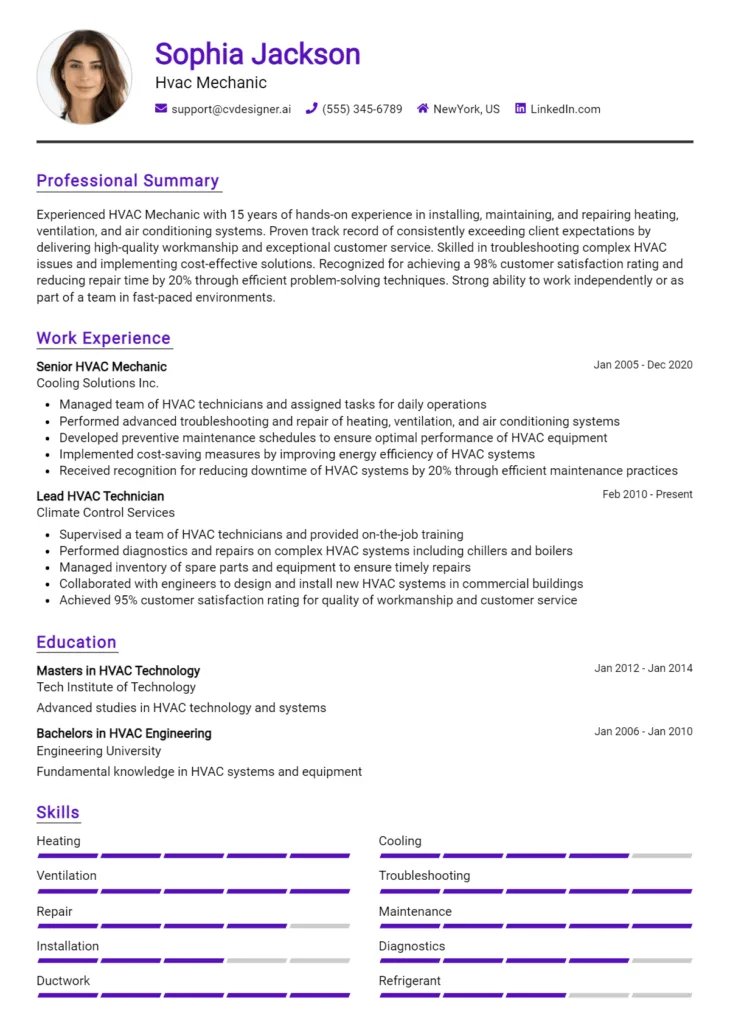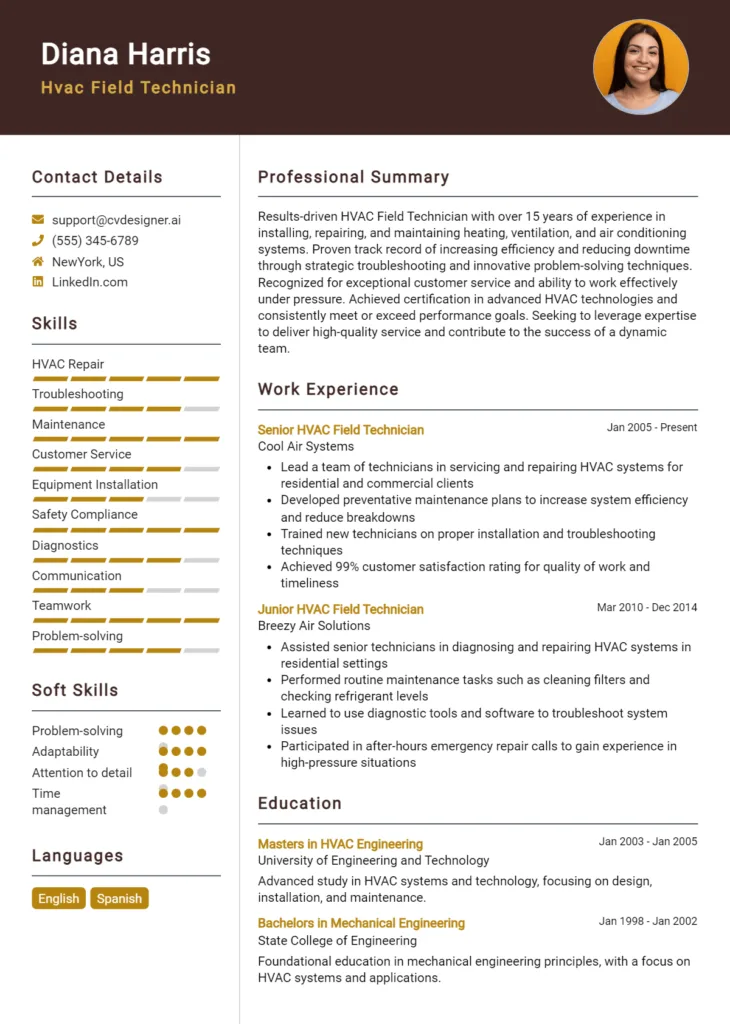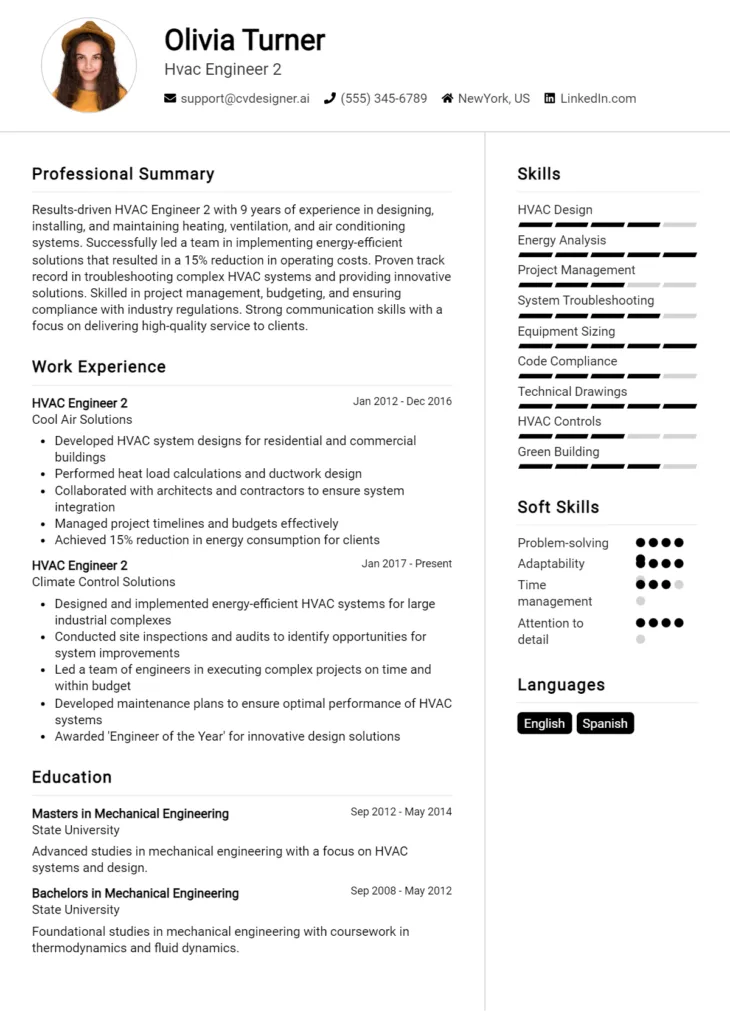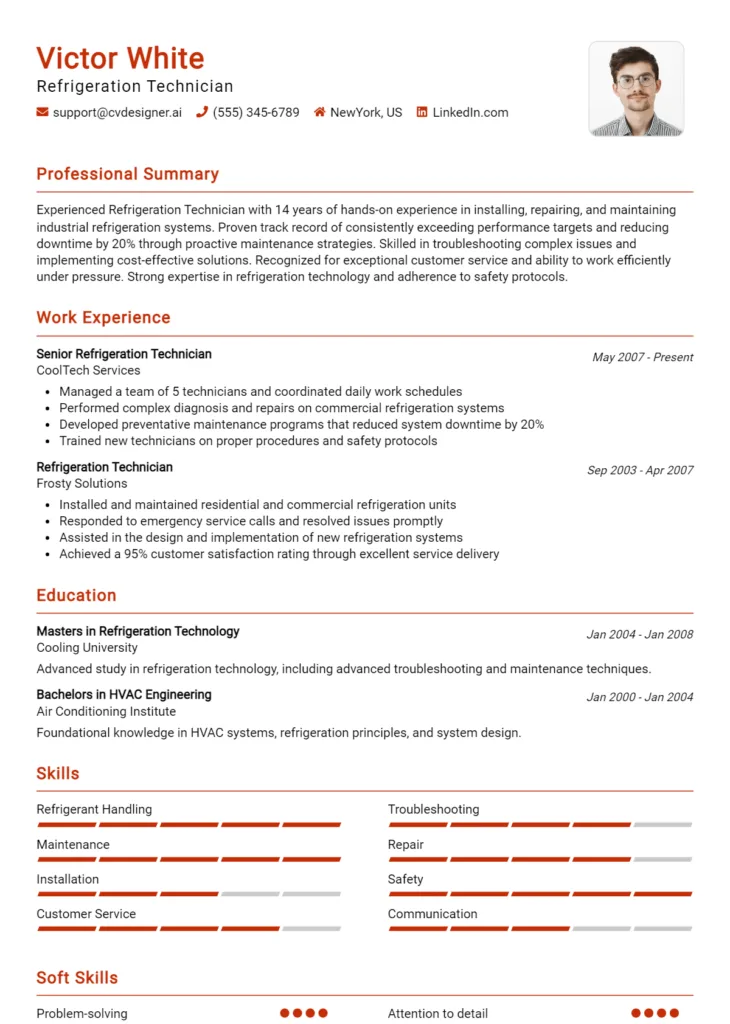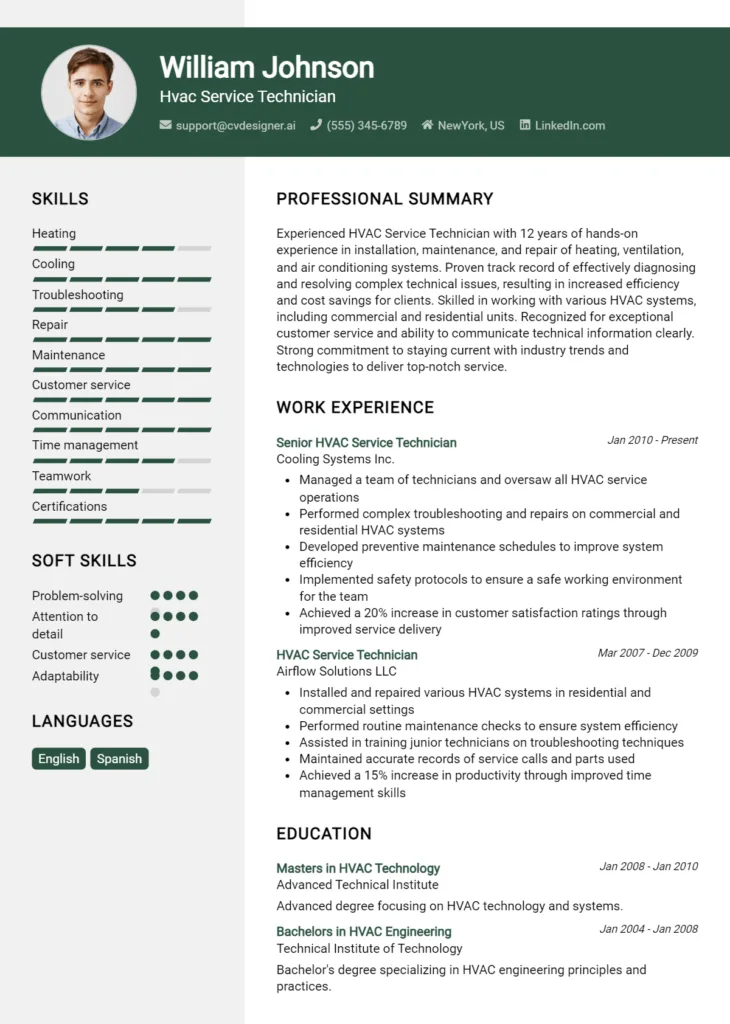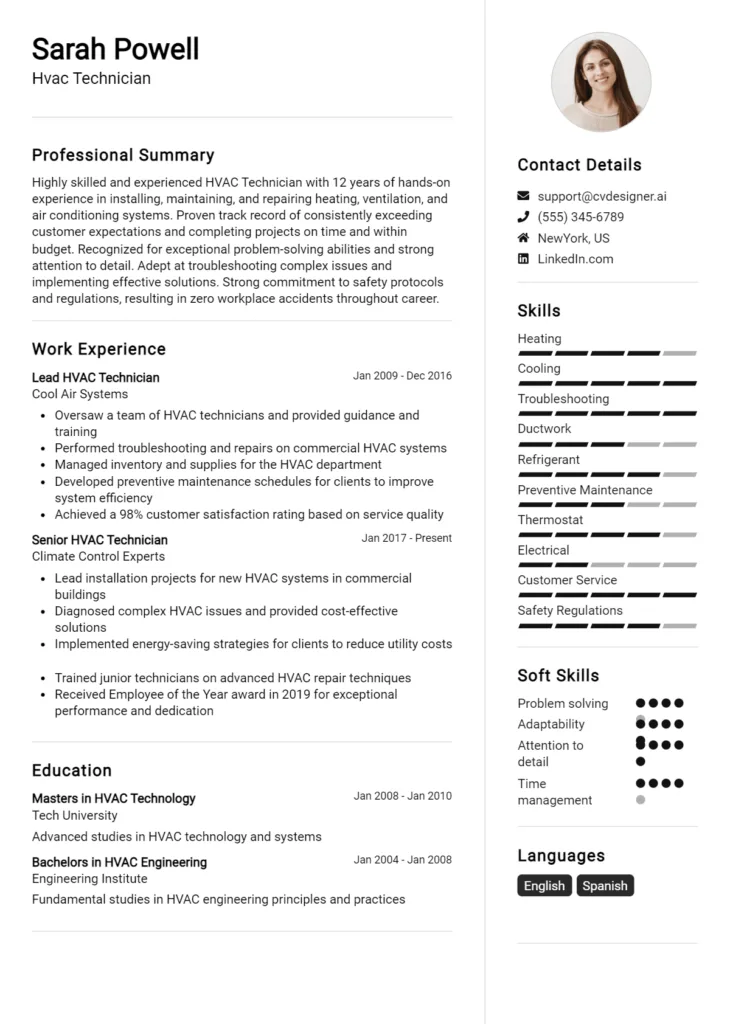HVAC Installer Core Responsibilities
HVAC Installers play a critical role in ensuring optimal indoor climate control by installing, maintaining, and repairing heating, ventilation, and air conditioning systems. This position requires technical proficiency in system components, operational knowledge of building codes, and strong problem-solving abilities to troubleshoot issues effectively. By bridging engineering, customer service, and safety compliance, HVAC Installers contribute significantly to organizational goals. A well-structured resume can effectively showcase these skills, emphasizing their importance in achieving operational efficiency.
Common Responsibilities Listed on HVAC Installer Resume
- Install and maintain HVAC systems, including air conditioners, furnaces, and ventilation units.
- Perform system diagnostics and troubleshooting to identify issues.
- Ensure compliance with local and national building codes and safety regulations.
- Conduct routine maintenance and repairs to optimize system performance.
- Collaborate with project managers and other trades to coordinate installation schedules.
- Provide excellent customer service and educate clients on system usage and care.
- Document service calls, maintenance activities, and repairs accurately.
- Maintain tools and equipment in safe and working order.
- Stay updated on industry trends and technologies related to HVAC systems.
- Assist in the design and layout of HVAC systems for new installations.
- Perform energy audits to recommend energy-efficient upgrades.
- Train junior technicians and apprentices in installation techniques and safety practices.
High-Level Resume Tips for HVAC Installer Professionals
In today’s competitive job market, a well-crafted resume is essential for HVAC Installer professionals looking to make their mark. Your resume is often the first impression you make on potential employers, and it needs to effectively showcase your skills, experience, and achievements in the industry. A compelling resume not only highlights your technical abilities but also conveys your dedication and professionalism. This guide will provide practical and actionable resume tips specifically tailored for HVAC Installer professionals, ensuring you stand out in a crowded field.
Top Resume Tips for HVAC Installer Professionals
- Tailor your resume to each job description, incorporating relevant keywords that match the employer's requirements.
- Showcase your relevant experience prominently, focusing on positions that directly relate to HVAC installation and maintenance.
- Quantify your achievements by including specific metrics, such as the number of systems installed or efficiency improvements achieved.
- Highlight industry-specific skills, such as knowledge of HVAC systems, safety protocols, and troubleshooting techniques.
- Include any certifications or licenses relevant to HVAC work, such as EPA certification or NATE certification.
- Utilize a clean and professional format, making it easy for hiring managers to navigate your resume quickly.
- Incorporate a summary statement at the top that encapsulates your experience and career goals in the HVAC field.
- List any additional skills, such as customer service or project management, that can add value to your application.
- Keep your resume to one page if you have less than 10 years of experience, ensuring it is concise and impactful.
- Proofread your resume thoroughly to eliminate any spelling or grammatical errors that could detract from your professionalism.
Implementing these tips can significantly increase your chances of landing a job in the HVAC Installer field. A polished and targeted resume not only reflects your qualifications but also demonstrates your commitment to your trade, setting you apart from other candidates and catching the eye of potential employers.
Why Resume Headlines & Titles are Important for HVAC Installer
In the competitive field of HVAC installation, a well-crafted resume headline or title is critical for making a strong first impression. This succinct phrase serves as a snapshot of a candidate's qualifications, allowing hiring managers to quickly gauge their potential fit for the role. A compelling headline not only grabs attention but also highlights essential skills and experiences relevant to the HVAC industry. Therefore, it should be concise, relevant, and tailored specifically to the job being applied for, setting the tone for the rest of the resume.
Best Practices for Crafting Resume Headlines for HVAC Installer
- Keep it concise: Aim for a headline that is one to two lines long.
- Be role-specific: Use keywords related to HVAC installation to ensure relevance.
- Highlight key qualifications: Focus on skills, certifications, or accomplishments that stand out.
- Use numbers or metrics: If applicable, quantify achievements to add impact.
- Avoid jargon: Use clear language that is easily understood by any hiring manager.
- Tailor for each application: Customize your headline to match the specific job description.
- Focus on value: Convey what you can bring to the employer rather than just listing your history.
- Make it engaging: Use action words that convey dynamism and expertise.
Example Resume Headlines for HVAC Installer
Strong Resume Headlines
Experienced HVAC Installer with 10+ Years in Energy-Efficient Solutions
Certified HVAC Technician Specializing in Residential and Commercial Systems
Detail-Oriented HVAC Installer with Proven Track Record in Client Satisfaction
Skilled HVAC Installer Known for Innovative Problem-Solving and Rapid Response
Weak Resume Headlines
Looking for HVAC Job
Experienced Worker in HVAC
Technician Seeking Opportunities in HVAC
The strong headlines are effective because they clearly communicate the candidate's experience, specialization, and value proposition in a way that is direct and relevant to the HVAC industry. They highlight specific skills and achievements, making the candidate stand out to hiring managers. In contrast, the weak headlines fail to impress due to their vagueness and lack of detail, providing little insight into the candidate’s qualifications or suitability for the role. A memorable and specific headline can significantly enhance a resume's impact and improve the chances of landing an interview.
Writing an Exceptional HVAC Installer Resume Summary
A well-crafted resume summary is crucial for HVAC installers as it serves as the first impression on hiring managers. This brief section quickly conveys the candidate's key skills, relevant experience, and notable accomplishments, making it essential to capture attention in a competitive job market. A strong summary should be concise and impactful, tailored specifically to the job being applied for, allowing the candidate to stand out by highlighting their unique qualifications and readiness to meet the demands of the position.
Best Practices for Writing a HVAC Installer Resume Summary
- Quantify Achievements: Use numbers to demonstrate the impact of your work, such as the number of installations completed or efficiency improvements achieved.
- Focus on Skills: Highlight specific technical skills relevant to HVAC installation, such as system troubleshooting, ductwork installation, or knowledge of energy-efficient systems.
- Tailor for the Job: Customize your summary to reflect the keywords and requirements mentioned in the job description.
- Be Concise: Keep the summary brief, ideally 2-4 sentences, to maintain the reader's attention.
- Showcase Certifications: Mention any relevant certifications or licenses that enhance your qualifications as an HVAC installer.
- Highlight Relevant Experience: Briefly touch on your years of experience and types of systems you have worked with.
- Use Action Words: Start with strong action verbs that convey your capability and expertise.
- Reflect Professionalism: Maintain a tone that reflects professionalism and a commitment to quality work.
Example HVAC Installer Resume Summaries
Strong Resume Summaries
Detail-oriented HVAC installer with over 7 years of experience in residential and commercial system installations. Successfully completed over 350 projects, increasing overall system efficiency by 20% through effective troubleshooting and client consultation.
Licensed HVAC technician with a proven track record of reducing installation time by 30% while maintaining compliance with all safety regulations. Expertise in both traditional and green energy systems, adept at customizing solutions according to client needs.
Results-driven HVAC installer with 5+ years of hands-on experience in high-pressure environments. Achieved a 95% customer satisfaction rating through excellent service delivery and proactive maintenance strategies across various HVAC systems.
Weak Resume Summaries
Experienced HVAC installer looking for a new job. I have worked on various projects.
HVAC technician with some skills and experience in installation and repair. Seeking to apply my knowledge in a new position.
The examples of strong resume summaries are effective because they include quantifiable results, specific skills, and relevant experience that align directly with the HVAC installer's role. They demonstrate clear achievements and a strong understanding of industry standards. In contrast, the weak summaries lack detail, specificity, and measurable outcomes, making them less compelling to potential employers. They fail to differentiate the candidates from others, which can lead to missed opportunities in the job market.
Work Experience Section for HVAC Installer Resume
The work experience section of an HVAC Installer resume is a vital component that allows candidates to effectively demonstrate their technical skills, project management abilities, and commitment to delivering high-quality installations. This section not only highlights the hands-on experience that HVAC professionals possess but also showcases their ability to lead teams and manage complex projects efficiently. By quantifying achievements—such as specific metrics on energy savings, successful project completions, or customer satisfaction ratings—and aligning experiences with industry standards, candidates can strengthen their resumes and enhance their appeal to potential employers.
Best Practices for HVAC Installer Work Experience
- Focus on specific technical skills relevant to HVAC systems, such as installation, maintenance, and troubleshooting.
- Quantify achievements with measurable outcomes, such as the percentage of energy savings achieved or the number of projects completed on time and within budget.
- Highlight any leadership roles taken, including managing teams or training new employees.
- Include relevant certifications or training that complement work experience.
- Use industry-specific terminology to demonstrate familiarity with HVAC standards and practices.
- Showcase collaboration with other tradespeople or departments to emphasize teamwork and communication skills.
- Detail experience with various HVAC systems, including residential, commercial, and industrial installations.
- Tailor work experience to align with the job description of the position being applied for.
Example Work Experiences for HVAC Installer
Strong Experiences
- Led a team of 5 technicians in the installation of a new HVAC system for a 50,000 square-foot commercial building, resulting in a 30% reduction in energy costs.
- Successfully managed over 150 HVAC installations in residential settings, maintaining a customer satisfaction rating of 95% based on post-installation surveys.
- Implemented preventive maintenance programs that decreased emergency service calls by 40% over two years, enhancing overall service efficiency.
- Conducted training sessions for junior technicians on the latest HVAC technologies, improving team productivity by 25%.
Weak Experiences
- Worked on HVAC installations and maintenance tasks.
- Helped with various projects without specifying roles or outcomes.
- Participated in team meetings and training sessions.
- Responsible for ensuring HVAC systems were working properly.
The examples considered strong stand out due to their specificity, quantifiable results, and clear demonstration of leadership and collaboration. They effectively illustrate the candidate's impact on projects and their ability to contribute to team success. In contrast, the weak experiences lack detail and measurable outcomes, making them less compelling and failing to showcase the candidate's skills or contributions meaningfully.
Education and Certifications Section for HVAC Installer Resume
The education and certifications section of an HVAC Installer resume is crucial for showcasing a candidate's academic background and professional qualifications. This section not only highlights the relevant degrees and certifications attained but also underscores the candidate's commitment to continuous learning and staying updated with industry standards. By including pertinent coursework, specialized training, and recognized certifications, candidates can significantly bolster their credibility and demonstrate their alignment with the specific demands of the HVAC Installer role. A well-structured education and certifications section can set candidates apart in a competitive job market, reflecting their preparedness and expertise in the field.
Best Practices for HVAC Installer Education and Certifications
- Prioritize industry-relevant certifications such as EPA Section 608, NATE, or HVAC Excellence.
- Include specific coursework that directly relates to HVAC systems, such as thermodynamics or refrigeration principles.
- List any hands-on training or apprenticeships that provide practical experience in HVAC installation.
- Highlight advanced certifications that demonstrate a higher level of expertise, such as LEED or advanced energy management.
- Ensure that the details are current and reflect your most recent educational achievements.
- Consider including ongoing training or workshops that show commitment to keeping skills up to date.
- Use clear formatting and consistent terminology to enhance readability and professionalism.
- Tailor the section to reflect the qualifications most relevant to the job you are applying for.
Example Education and Certifications for HVAC Installer
Strong Examples
- Associate Degree in HVAC Technology, ABC Community College, 2022
- EPA Section 608 Certification - Universal, 2023
- NATE Certified HVAC Technician, 2023
- Completed Advanced Refrigeration Systems coursework, XYZ Technical Institute, 2021
Weak Examples
- Bachelor's Degree in Business Administration, 2020 (not relevant to HVAC)
- Certification in Office Management, 2019 (not applicable to HVAC installation)
- High School Diploma, 2015 (does not provide relevant skills or knowledge)
- Outdated HVAC Technician Certification, 2018 (no longer recognized in the industry)
The strong examples are considered effective as they directly relate to the HVAC Installer profession, showcasing relevant degrees and up-to-date certifications that reflect the candidate's qualifications. They demonstrate a focused educational background and a commitment to industry standards. In contrast, the weak examples lack relevance to the HVAC field, fail to demonstrate current skills or knowledge, and do not contribute to the candidate's credibility in this specialized role.
Top Skills & Keywords for HVAC Installer Resume
As an HVAC Installer, showcasing the right skills on your resume is crucial to demonstrate your expertise and suitability for the job. Employers seek candidates who not only possess technical knowledge but also have the interpersonal abilities to work effectively within a team and communicate with clients. Highlighting both hard and soft skills can set you apart from other applicants, portraying a well-rounded professional who can handle the demands of the HVAC industry. A strong resume not only reflects your qualifications but also serves as a marketing tool to present your capabilities to potential employers.
Top Hard & Soft Skills for HVAC Installer
Soft Skills
- Strong communication skills
- Problem-solving abilities
- Attention to detail
- Customer service orientation
- Teamwork and collaboration
- Time management
- Adaptability
- Critical thinking
- Conflict resolution
- Dependability
Hard Skills
- Knowledge of HVAC systems and components
- Proficiency in installation and maintenance techniques
- Understanding of electrical and mechanical systems
- Familiarity with local building codes and regulations
- Ability to read blueprints and technical diagrams
- Skills in troubleshooting and diagnostics
- Experience with refrigerants and EPA regulations
- Competence in using HVAC tools and equipment
- Knowledge of energy efficiency standards
- Basic plumbing skills
For more information on how to effectively showcase your skills and work experience, consider exploring additional resources to enhance your resume.
Stand Out with a Winning HVAC Installer Cover Letter
I am writing to express my interest in the HVAC Installer position at [Company Name], as advertised on [Job Posting Source]. With over [X years] of hands-on experience in the HVAC industry, I have developed a comprehensive skill set that includes installation, maintenance, and repair of heating, ventilation, and air conditioning systems. My commitment to delivering high-quality workmanship and exceptional customer service has consistently resulted in positive feedback from clients and supervisors alike.
Throughout my career, I have successfully installed a variety of HVAC systems in both residential and commercial settings, ensuring they meet industry standards and regulations. I possess a thorough understanding of blueprints and technical diagrams, which allows me to perform precise installations efficiently. Moreover, my proficiency in troubleshooting and diagnosing complex HVAC issues has enabled me to resolve problems quickly, minimizing downtime for my clients. I am also well-versed in the latest HVAC technologies and practices, which I incorporate into my work to enhance system performance and energy efficiency.
In addition to my technical skills, I pride myself on my strong communication abilities. I believe that clear and open communication with clients is essential for understanding their needs and providing tailored solutions. I am dedicated to keeping clients informed throughout the installation process and educating them on proper system maintenance to extend the life of their equipment. My ability to work collaboratively with team members and maintain a positive attitude in high-pressure situations further enhances my effectiveness as an HVAC Installer.
I am excited about the opportunity to join [Company Name] and contribute to your reputation for excellence in HVAC services. I am confident that my expertise and commitment to quality align with your company’s values. I look forward to the possibility of discussing how I can support your team and enhance customer satisfaction through my skills and experience. Thank you for considering my application.
Common Mistakes to Avoid in a HVAC Installer Resume
When crafting a resume for an HVAC Installer position, it's essential to present your skills and experience effectively. Many candidates make common mistakes that can hinder their chances of landing an interview. By avoiding these pitfalls, you can create a compelling resume that highlights your qualifications and sets you apart from other applicants. Here are some common mistakes to be aware of:
Vague Job Descriptions: Failing to provide specific details about your previous roles can leave employers uncertain about your skills. Use clear, concise language to describe your responsibilities and achievements.
Ignoring Relevant Certifications: HVAC work often requires specific certifications. Not mentioning them or placing them in an obscure section can overlook crucial qualifications that employers are looking for.
Overloading with Technical Jargon: While it's important to showcase your technical skills, using too much industry jargon can confuse hiring managers, especially if they are not HVAC specialists. Balance technical terms with clear language.
Lack of Quantifiable Achievements: Simply listing duties without demonstrating the impact of your work can weaken your resume. Include measurable outcomes, such as "Improved system efficiency by 20%."
Neglecting to Tailor the Resume: Using a one-size-fits-all resume can be detrimental. Tailor your resume for each job application to highlight the most relevant skills and experiences.
Poor Formatting: An unorganized resume can make it difficult for employers to read. Use a clean, professional layout with headings and bullet points for easy navigation.
Omitting Soft Skills: While technical skills are critical, soft skills like communication, teamwork, and problem-solving are also important. Failing to highlight these can make your resume less appealing.
Spelling and Grammar Errors: Typos and grammatical mistakes can create a negative impression. Always proofread your resume or have someone else review it before submission.
Conclusion
As we wrap up our discussion on the HVAC Installer role, it’s essential to highlight the critical skills and qualifications that can set you apart in this competitive field. From technical expertise in heating, ventilation, and air conditioning systems to strong problem-solving abilities and customer service skills, a well-rounded HVAC Installer is crucial for ensuring efficient installations and maintenance.
Moreover, certifications and ongoing education in the latest technologies can significantly enhance your resume. Employers are looking for candidates who not only possess the fundamental skills but also demonstrate a commitment to professional growth.
Now that you are aware of what makes a standout HVAC Installer, it’s time to take action. Review and update your HVAC Installer resume to reflect your skills, certifications, and experiences accurately. To assist you in this process, consider utilizing a variety of resources available to you. You can explore our resume templates for guidance on layout and design, use our resume builder for a step-by-step approach to crafting your resume, check out resume examples to inspire your content, and don’t forget to create a compelling cover letter with our cover letter templates.
Take the time to refine your application materials today, and make sure you present yourself as the ideal candidate for your next HVAC Installer opportunity!

